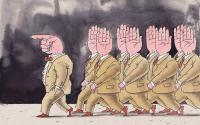23 March 2006Don Hazen
 |
| Photo courtesy of David Fenton, from his book Shots, published by Ten Speed Press. |
Late into Dana Spiotta's brilliant new novel, "Eat the Document," the protagonist, a woman who has lived "underground" for years, hiding from the consequences of a 1960s political protest gone badly awry, flashes back to the moment of choice:
"The question is, do we want to leave action to the brutes of the world? … There are some inherent problems built into acting. It lacks perfection. But I believe we must fight back, or we will feel shame all our lives. We, the privileged, are more obligated. It is a moral duty to do something, however imperfect. … If we don't do something, all our lives we will feel regret."
Lately, I've been thinking a lot about the '60s (actually the period from '67 to '73) -- that political era so filled with possibility, so much a part of the blood and souls of millions of aging baby boomers like myself. The period was profoundly effective in the changes it provoked, yet is so persistently pilloried for its exaggerated excesses. One reason I find myself looking back is the pervasive feeling of political impotence so many of us feel at this moment in history, and our seeming inability to act -- to be noticed, to make a difference.
There are some present-day chilling parallels to the repression of the Nixon era -- and of course many differences -- but there is a feeling in the air that smells like the '60s, that sends paranoid vibes through the body politic. The events taking place -- warrantless wiretapping, political corruption, torture, the war in Iraq with its disgusting profiteering while tens of thousands of people die -- demand a response equal to the situation, Yet we sit without a clear path showing us our step.
A short time ago, in a funding appeal to the AlterNet community, I wrote: "I haven't felt this angry, frightened or radical in a long time. We can no longer just do what we have been doing. In my several decades working in politics and media, the present feels dire."
Those were my emotions; however, I didn't offer an action plan. The best I could do was ask for support so AlterNet could continue being a thorn in the side of the Bush administration. Important, but not sufficient.
In the first draft of my appeal letter, I had also written: "Not since John Mitchell was attorney general and a paranoid, anti-Semitic Richard Nixon at the helm, have we been under an assault close to what we have today. And we don't have a Watergate to get Bush out of office." My editor suggested I take those sentences out -- "No need to go back to the past, and younger readers probably won't relate to this piece of history," she said. So I did.
But my memory of that time is still so powerful, because many of us did act -- sometimes wildly, sometimes irresponsibly -- and we couldn't be ignored. And who can say that the Bush administration isn't shockingly irresponsible every day?
I remember so clearly the May Day 1971 protests in Washington, D.C., glaring at Attorney General John Mitchell as he stood on the roof of the Justice Department, puffing his ever-present pipe and pretending to ignore the thousands of screaming, chanting masses in the street. The WikiPedia describes May 3, 1971, as "one of the most disruptive actions of the Vietnam War era."
The threat caused by the May Day Protests forced the Nixon administration to create a virtual state of siege in the nation's capital. Thousands of federal and National Guard troops, along with local police, suppressed the disorder, and by the time it was over several days later, over 10,000 would be arrested. It would be the largest mass arrest in U.S. history.
That's not a typo: More than 10,000 people were arrested, jammed into jails that resembled crowded elevators and bused out to RFK Stadium. It was crazy, anarchistic and perhaps politically naive, but it was action. It made an impression. We were noticed. And it was exhilarating to bond with so many in a cause that felt so just. Critics may suggest that the protest made things worse, that it played into the hands of the Republicans. But I don't think so. Resistance is important. (There is a parallel today, with some critics charging that talk of impeaching Bush and Sen. Russ Feingold's motion to censure are also counterproductive.)
The '60s era was a profoundly energetic mix of culture and politics. That decade has been distorted, caricatured and turned into a black-and-white cartoon -- when not appropriated to sell cars with Jimmy Hendrix music and pricey clothing like the Miss Sixty line.
It is time to resurrect the good '60s and help many people understand much of what has been hidden. It was an era when millions of people were clear about their values -- especially nonmaterial aspirations, and sharing, and ways of living simply that have long since been steamrollered by the nonstop tsunami of global consumer culture. Today, with the looming threat of diminishing oil supply (often referred to as peak oil), some people are already revisiting and experimenting with the best of the "back to the land movement," in anticipation of harder times down the road.
One example of yanking '60s history out of the closet is the new film, "Sir! No Sir!," by David Zeiger. This documentary, which opens April 7, tells the powerful story of how soldiers rebelled within the ranks of the U.S. military in reaction to the insanity of the Vietnam War. It portrays the culture of the GI coffeehouses and the barnstorming actors and musicians led by Jane Fonda, who nurtured the resistance. In the end, the film makes a convincing case that Nixon and Kissinger had no choice but to get the hell out of Vietnam. Toward the end of the war, thousands of GIs were refusing to do battle -- some fragging officers who attempted to force them into hopeless and treacherous situations.
When I saw the film recently in Mill Valley, Calif., both Jane Fonda and Cindy Sheehan were present to honor many of the courageous vets who fought the war from the inside. Fonda made one crucial point that night that stuck with me. She said that everyone associated with the successful soldier rebellion and the powerful themes of the '60s had to be demonized by the government and the media or else our military might would be called into question -- the illusion of power we need to maintain empire. The result is that soldiers who had the best of intentions and told the truth about what was really happening in Vietnam would be forever labeled as unpatriotic.
At no time were the consequences of this tarring effort more profound than the "Swift Boat Veterans'" spurious attack on John Kerry during the 2004 election, and the corporate media's inability or refusal to stop its effect. Kerry was a war hero who came back from Vietnam and bravely spoke out against the war. Ultimately, his honesty probably cost him the presidency -- to a phony soldier who escaped service only to lead us into the brutal quagmire of Iraq.
Corporate America, conservative politicians and even erstwhile '60s radicals have worked hard to seal off the decade as an artifact of Charles Manson, free love excess, bad acid trips and political mayhem. The generations that followed the boomers grew sick and tired of hearing about their exploits, while some suffered the consequences of bad parenting and backlash. But the younger generations, often the offspring of the boomers, are much more eager to examine the unfinished business of that era; at least it seems that way from conversations I have had.
Today, many of us feel a deep political malaise. It is hard to figure out how to act. There are two traditional paths to social change, and many of us participate in both. The first is protest. On the brink of the invasion of Iraq, demonstrations whose size went far beyond our expectations filled the streets of cities across the globe. Tens of millions marched. We knew then precisely what we know now: that the war was based on pretense and that it was wrong -- and we have been profoundly proven correct. Yet our protests failed to stop it and continue to fail three years later. When you do your best and fail, it is hard to bounce back.
Then came the election, our second path to change. Again many thousands jumped in to participate in new ways, feeling sure we could give Bush the boot. Again, shockingly to many, we didn't succeed and have been in the dumps ever since. The extra kicker is the unspeakable fear that, with corrupt politics and electronic voting machines, maybe elections aren't winnable at all.
In the face of this semiparalysis, '60s values need to be liberated to give us some inspiration and updated to fit our present day. These values don't belong to just one generation, but rather to a historical river of ideas and ideals that stretch back into history. They are ready to be claimed by new generations and reclaimed by those who remember what it was like the first time around.
I also wrote in my letter to AlterNet readers: "We forget sometimes that the values we treasure -- equality, fairness, justice, dignity, and ultimately kindness and love -- inspired the greatest moral and political achievements of the 20th century: civil rights, women's equality, the right to organize and the growth of the environmental movement. These values make our society strong and appealing to the rest of the world. They are what we are fighting for."
It is not going to be easy to pull ourselves out of this political purgatory. There is evidence that history is on our side, but it requires that we act -- not wish, or watch or wax nostalgic, but do something concrete. Having tens of thousands of us run around Washington trying to shut down the government is probably not quite the right idea. What is necessary is something that meets the demands of the time, that will catch people by surprise and give us a way to climb out of the doldrums.
We need to show that we are not down and out, that we are able to act. Cindy Sheehan has shown us how standing up and speaking from the heart can have a big impact. In preparation, let's resurrect some of the hidden history of the '60s and get some inspiration from a time when acting, despite being messy and imperfect, made a lot of good things happen.
Don Hazen is the executive editor of AlterNet.






